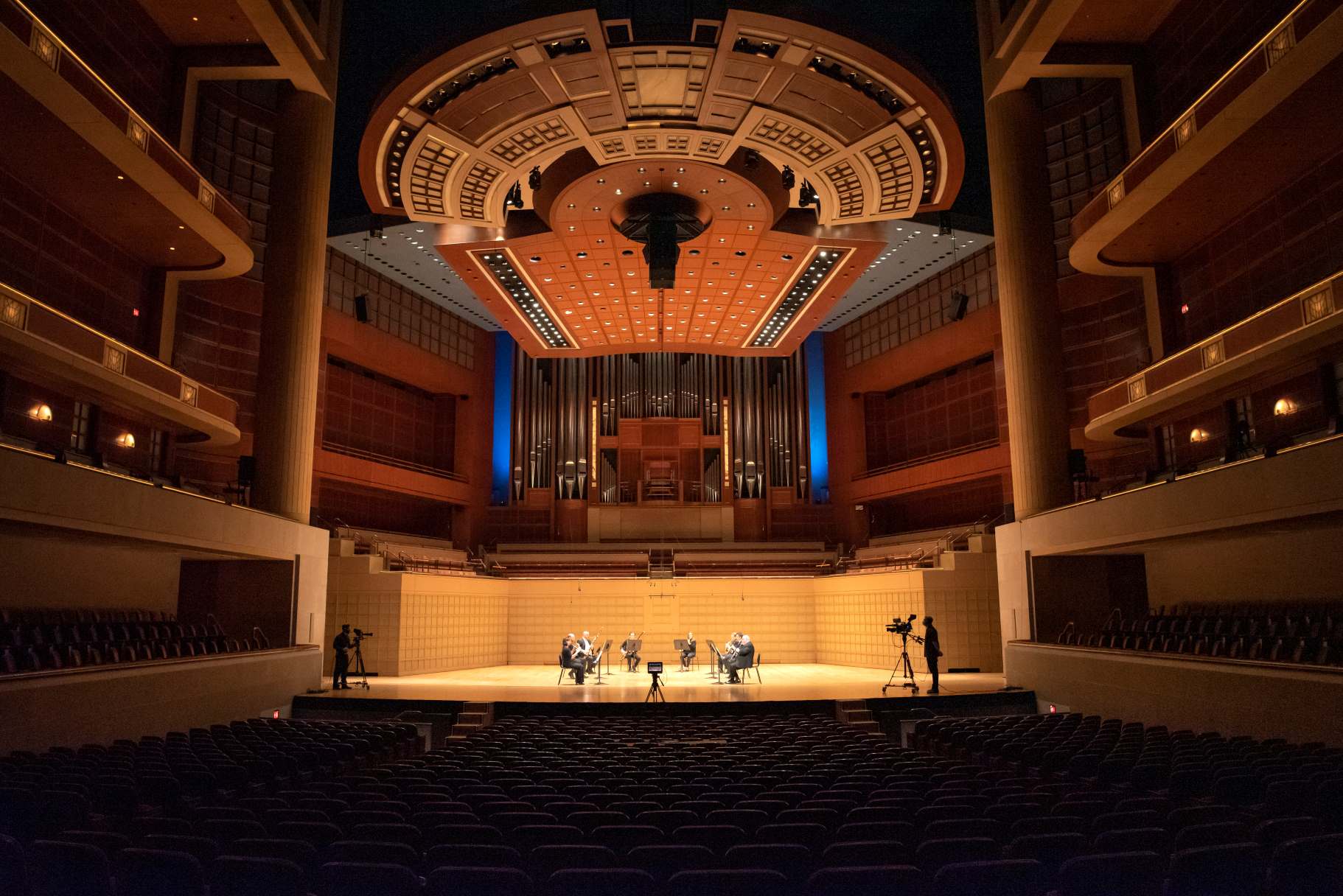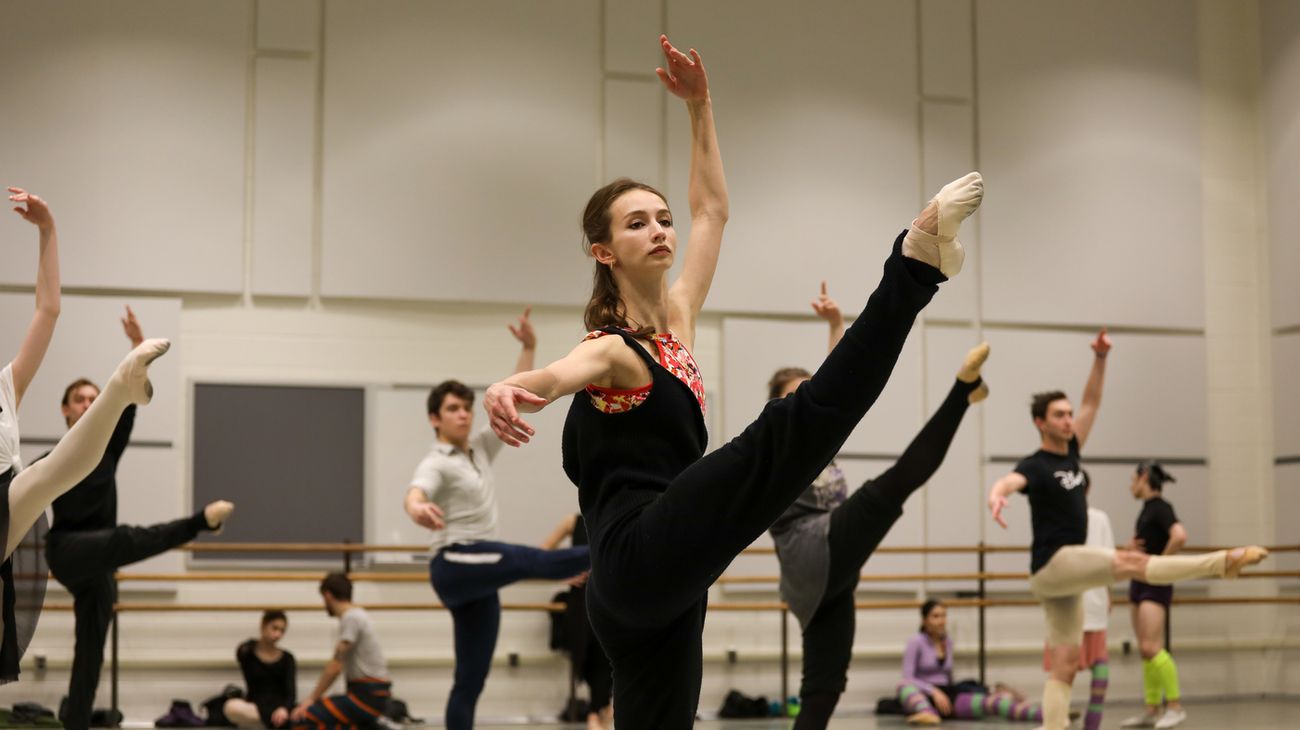Home>Genres>Symphony>How Much Do Dallas Symphony Musicians Make


Symphony
How Much Do Dallas Symphony Musicians Make
Modified: January 22, 2024
Discover how much Dallas Symphony musicians make and gain valuable insights into the salaries and compensation packages of Symphony professionals in Dallas.
(Many of the links in this article redirect to a specific reviewed product. Your purchase of these products through affiliate links helps to generate commission for AudioLover.com, at no extra cost. Learn more)
Table of Contents
Introduction
The Dallas Symphony Orchestra is a world-renowned symphony located in Dallas, Texas. Its rich history and commitment to excellence have solidified its reputation as one of the leading orchestras in the United States. As with any professional orchestra, the salaries of the musicians play a crucial role in attracting top talent and ensuring the highest level of performance.
In this article, we will delve into the details of how much Dallas Symphony musicians make and explore the factors that influence their salaries. We will also take a closer look at the benefits and additional compensation they receive, as well as the negotiation process and contracts that govern their employment. Additionally, we will compare the salaries of Dallas Symphony musicians with those of musicians in other orchestras to provide a comprehensive understanding of the industry standards.
Whether you are a music enthusiast curious about the inner workings of a symphony orchestra or a musician aspiring to join a professional ensemble, this article will offer valuable insights into the financial aspects of being a member of the Dallas Symphony Orchestra.
Background of the Dallas Symphony Orchestra
The Dallas Symphony Orchestra (DSO) was founded in 1900 and has since become one of the most distinguished symphonies in the country. Its mission is to inspire, entertain, and educate through the performance of great music. Led by world-renowned conductor Fabio Luisi, the DSO is known for its exceptional musicianship and innovative programming.
Over the years, the DSO has developed a strong reputation for its commitment to community engagement and music education. It strives to bring the joy and beauty of classical music to audiences of all ages and backgrounds. The orchestra regularly collaborates with renowned guest artists and performs in a variety of venues, including the iconic Morton H. Meyerson Symphony Center.
The DSO is financially supported by a combination of public funding, corporate sponsorships, individual donors, and ticket sales. Its success and sustainability rely on the dedication and talent of its musicians, who form the backbone of the orchestra.
As an ensemble, the DSO performs a wide range of repertoire, including classical masterpieces, contemporary works, and pops concerts. The musicians undergo rigorous auditions and must meet high artistic standards to secure a position in the orchestra. Once selected, they become an integral part of the DSO family, contributing their individual talents to the collective sound.
The Dallas Symphony Orchestra not only performs in its home city but also takes part in national and international tours, showcasing its exceptional musicianship and promoting the cultural vitality of Dallas on a global scale. These tours provide opportunities for the musicians to gain exposure, collaborate with renowned artists, and represent the city of Dallas on an international stage.
Factors Influencing Musician Salaries
Several factors influence the salaries of musicians in the Dallas Symphony Orchestra. These factors play a crucial role in determining the compensation levels and reflect the unique dynamics of the classical music industry.
1. Experience and Seniority: Musicians in the DSO are categorized into different ranks based on their experience and seniority. The higher the rank, the higher the salary. Musicians who have been with the orchestra for a longer period of time and have demonstrated exceptional skill and dedication are rewarded with higher compensation.
2. Position and Specialty: In an orchestra, different instruments and sections have varying levels of demand and importance. Principal players, who lead sections such as the violin, cello, or trumpet, often receive higher salaries compared to other musicians in the ensemble. Additionally, musicians with specialized skills, such as playing rare instruments or excelling in particular musical styles, may command higher salaries.
3. Prestige and Reputation: The reputation of the Dallas Symphony Orchestra as a world-class ensemble also influences musician salaries. The orchestra’s standing in the industry, as well as its performance history and critical acclaim, can impact the ability to attract top talent and justify higher compensation packages.
4. Economic Factors: The financial health of the orchestra and its ability to secure funding and sponsorships directly impact musician salaries. When the orchestra is experiencing a surplus and financial stability, there may be room for salary increases. Conversely, during challenging economic times or budget constraints, musicians may need to accept reductions or freezes in their compensation.
5. Local Cost of Living: The cost of living in Dallas, Texas, also influences musician salaries. Orchestra management takes into account the expenses associated with living in the area when determining compensation. Higher living costs may result in higher salaries to ensure that musicians can maintain a reasonable standard of living.
6. Collective Bargaining Agreements: The negotiation process between the musicians’ union and orchestra management plays a significant role in determining salaries. Through collective bargaining agreements, both parties work out the terms and conditions of employment, including salaries, benefits, and working conditions.
It is important to note that the salary determination process is multifaceted and considers a variety of factors specific to each orchestra. This ensures that musician compensation reflects their skill, experience, and the unique demands of their profession within the context of the orchestra’s financial situation and overall industry standards.
Base Salary of Dallas Symphony Musicians
The base salary of Dallas Symphony musicians is an essential component of their overall compensation. It serves as the foundation upon which additional benefits and compensation are built.
The base salary for musicians in the Dallas Symphony Orchestra varies depending on their rank and position within the ensemble. As of the latest available information, the 2021-2022 base salary for an entry-level musician in the orchestra is approximately $68,000 per year. This figure represents the starting point for new musicians who join the DSO.
However, it is important to note that musicians who occupy higher-ranking positions, such as concertmasters and principal musicians, receive higher base salaries. These positions carry greater responsibility and leadership roles within the orchestra, warranting a higher compensation level. The base salary for these top-ranking musicians can be significantly higher, ranging from around $100,000 to $200,000 per year.
It is important to emphasize that this base salary is subject to change based on collective bargaining agreements, economic conditions, and other factors that affect the financial stability of the Dallas Symphony Orchestra. Negotiations between the musicians’ union and orchestra management play a crucial role in determining potential increases or adjustments to base salaries.
Additionally, it is worth mentioning that base salaries may also increase over time as musicians gain more experience. Promotion within the orchestra’s rank structure can lead to salary advancements and recognition of the musicians’ growth and commitment to their craft.
The base salary provided to Dallas Symphony musicians not only reflects their artistic skill and dedication but also contributes to their overall financial stability and livelihood. It serves as a recognition of the demanding nature of their profession and provides a solid foundation for the additional compensation and benefits they receive as members of the orchestra.
Benefits and Additional Compensation
While the base salary forms the core of a Dallas Symphony musician’s compensation, they also receive a range of benefits and additional compensation that contribute to their overall financial well-being. These supplementary elements recognize their talent, dedication, and the unique demands of their profession.
1. Health and Retirement Benefits: Dallas Symphony musicians typically receive comprehensive health insurance coverage, which helps safeguard their well-being and provides peace of mind. This includes medical, dental, and vision insurance. Additionally, the orchestra often offers a retirement plan, such as a 401(k), enabling musicians to save for their future.
2. Paid Time Off: Musicians are entitled to paid time off, including vacation and sick leave. This allows for necessary rest and recuperation, ensuring they can maintain a healthy work-life balance and recharge their creative energies.
3. Instrument Insurance and Maintenance: Musicians in the Dallas Symphony Orchestra often have valuable instruments that require specialized care and maintenance. The orchestra typically provides instrument insurance to protect these investments and may cover the costs associated with repairs and maintenance.
4. Travel and Per Diem: Musicians may receive additional compensation for travel expenses when they go on tour or perform in different venues. The orchestra often provides a per diem allowance to cover meals and incidental expenses incurred during away-from-home performances.
5. Recording and Broadcasting Royalties: The Dallas Symphony Orchestra frequently records and broadcasts its performances. As part of their compensation package, musicians may receive royalties or additional payments when their performances are featured in commercial recordings or broadcasted on television or radio.
6. Education and Outreach Engagements: The musicians of the Dallas Symphony Orchestra often engage in educational and outreach activities, such as school visits, masterclasses, and community concerts. These engagements may provide additional compensation beyond their regular salary.
It is worth noting that the specific details of these benefits and additional compensation can vary based on individual contracts and collective bargaining agreements. Orchestra management and the musicians’ union work together to define and negotiate the terms of these benefits, ensuring that musicians are fairly compensated for their work.
The combination of the base salary and these additional benefits and compensations creates a comprehensive package that recognizes the value and commitment of Dallas Symphony musicians. It reflects the orchestra’s commitment to supporting its musicians’ welfare and maintaining a thriving, collaborative artistic community.
Negotiations and Contracts
Negotiations and contracts play a pivotal role in determining the terms and conditions of employment for musicians in the Dallas Symphony Orchestra. These negotiations are conducted between the musicians’ union, typically the American Federation of Musicians (AFM), and orchestra management. Through collective bargaining, they work to establish fair and equitable agreements that govern the employment relationship.
Collective bargaining agreements outline various aspects of musicians’ employment, including salary structures, benefits, working conditions, and other important considerations. These agreements are typically established for a specific period, such as two or three years, and are subject to renegotiation when they expire.
The negotiation process involves representatives from both sides engaging in discussions to reach a mutually agreeable contract. Musicians rely on the expertise and guidance of their union to advocate for their interests, while orchestra management aims to balance the financial sustainability of the organization with the needs and aspirations of the musicians.
During negotiations, key factors such as musician salaries, health insurance coverage, paid time off, retirement plans, and various other benefits are addressed and determined. Both parties analyze financial data, budget constraints, industry standards, and the overall artistic and operational goals of the orchestra in crafting a suitable agreement.
Once the negotiation process is complete, and an agreement is reached, the terms are documented in a formal contract. This contract serves as a binding agreement between the musicians and the orchestra management, outlining their rights, responsibilities, and obligations during the specified period.
It is important to note that negotiations and contracts not only cover financial aspects but also address important non-monetary factors such as working hours, rehearsal schedules, guest artist agreements, and procedures for addressing grievances or disputes. These factors contribute to creating an environment that promotes a harmonious and productive relationship between the musicians and the orchestra management.
The negotiation and contract process ensures transparency, fairness, and stability in the employment relationship between the Dallas Symphony Orchestra and its musicians. It creates a framework for collaboration, artistic growth, and financial security, allowing both the musicians and the organization to thrive.
Comparison of Musician Salaries in Other Orchestras
When considering the salaries of musicians in the Dallas Symphony Orchestra, it is beneficial to compare them with the compensation offered by other renowned orchestras across the country. Understanding the industry standards provides valuable context and insight into the financial landscape for professional classical musicians.
Salaries can vary significantly between orchestras due to factors such as budget size, geographic location, and the prestige of the ensemble. Some orchestras have a longer history and established reputation, which can lead to higher compensation levels. Here are a few examples of orchestras and their average musician salaries:
1. New York Philharmonic: The New York Philharmonic, one of the most prestigious orchestras in the world, is known for its high salaries. As of 2021, the base salary for musicians in the orchestra starts at around $150,000 per year.
2. Boston Symphony Orchestra: Another renowned ensemble, the Boston Symphony Orchestra, offers competitive salaries. The base salary for musicians in the orchestra is approximately $148,000 per year.
3. Los Angeles Philharmonic: The Los Angeles Philharmonic, located in the heart of the entertainment industry, has a base salary of around $143,000 per year for its musicians.
4. Cleveland Orchestra: The Cleveland Orchestra, highly regarded for its exceptional artistry, offers a base salary of approximately $140,000 per year.
It is essential to note that these figures represent the base salaries and do not include additional benefits and compensation that musicians may receive, such as health insurance, retirement plans, and instrument maintenance coverage.
When comparing the Dallas Symphony Orchestra to these ensembles, it is evident that salary levels may differ. While the base salary for entry-level musicians in the Dallas Symphony Orchestra is around $68,000 per year, it is important to remember that the cost of living in Dallas is generally lower than in cities like New York or Boston. The Dallas Symphony Orchestra strives to offer competitive salaries that align with industry standards and the economic dynamics of the local area.
Understanding the range of salaries offered by different orchestras provides musicians with valuable information when considering employment opportunities. Factors such as an orchestra’s reputation, financial stability, cost of living, and career prospects should all be taken into account when evaluating compensation packages.
It is worth mentioning that musician salaries can change over time due to various factors, including economic conditions, fundraising efforts, and evolving industry standards. Orchestras continuously work to attract and retain top talent by ensuring competitive compensation levels that reflect the value and dedication of their musicians.
Conclusion
The salaries of musicians in the Dallas Symphony Orchestra are a vital aspect of their professional lives and reflect the value placed on their talent, skill, and dedication. Understanding the factors that influence their compensation provides insight into the financial dynamics of the classical music industry and the efforts made to sustain a thriving artistic community.
While the base salary serves as a foundational component of their compensation, Dallas Symphony musicians also benefit from a range of additional benefits and compensation. These include health and retirement benefits, paid time off, instrument insurance and maintenance coverage, travel allowances, recording and broadcasting royalties, and educational outreach engagements.
Negotiations and contracts between the musicians’ union and orchestra management play a crucial role in determining the terms of employment, ensuring fairness and stability for both parties. These negotiations address not only financial aspects but also non-monetary factors such as working conditions and grievance procedures, fostering a harmonious and collaborative environment.
When comparing musician salaries across different orchestras, it is evident that compensation levels can vary based on factors such as budget size, geographic location, and the reputation of the ensemble. While the base salary for entry-level musicians in the Dallas Symphony Orchestra may be lower compared to some other renowned orchestras, it is necessary to consider the overall cost of living and economic factors specific to the Dallas area.
Ultimately, the Dallas Symphony Orchestra strives to provide competitive salaries that recognize the talent, expertise, and commitment of its musicians. The orchestra’s dedication to artistic excellence, community engagement, and music education is reflected not only in the financial compensation but also in the opportunities for personal and professional growth.
Being a member of the Dallas Symphony Orchestra is not just about financial remuneration, but also about being part of a vibrant artistic community, collaborating with renowned artists, engaging with audiences, and showcasing the transformative power of classical music. The financial support provided ensures that the Dallas Symphony musicians can continue to inspire, entertain, and enrich the lives of people in Dallas and beyond for years to come.











